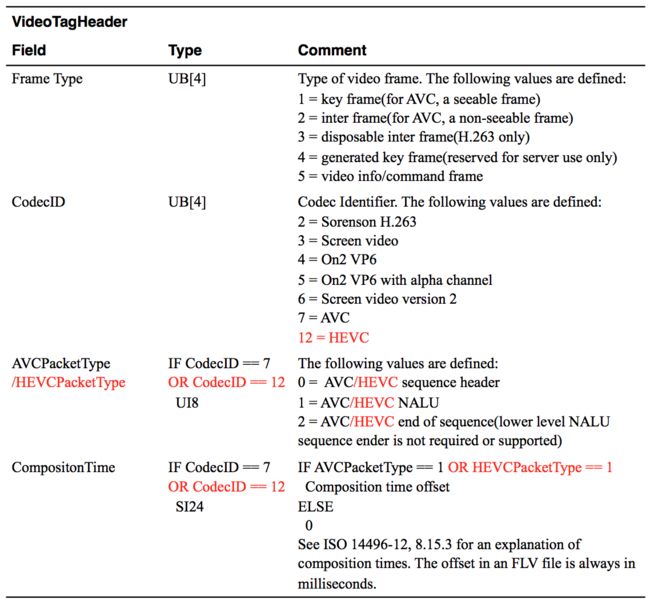如何实现RTSP H.265(hevc)流转RTMP H.265(hevc)推流到RTMP流媒体服务器实现互联网CDN直播
说到RTSP H.265(HEVC)转RTMP,首先要对RTMP协议有所了解,RTMP协议里面原本是没有H.265的定义的,国内的CDN厂家联合起来制定了一个关于RTMP/FLV扩展H.265(HEVC)的方案,这是为了适应国内视频互联网高速发展而来的,目前国内开发者基本上都按这个扩展协议做的。
RTMP头部信息封装并没有定义HEVC,我们采用CDN联盟的HEVC扩展标准,将HEVC的VideoTagHeader定义为12,详见下图:
RTMP推流
协议层已经确定,下一步的关键问题是要实现RTMP H.265(HEVC)推送模块,在视频推送上面,我们可以选择ffmpeg或者EasyRTMP,两者都可以支持H.265(HEVC)的RTMP推流,但是ffmpeg是需要做一些小小的修改和重新编译的:
- 第一步:我们在H264封装的基础上进行改进,以支持HEVC头部的封装,而HEVC头有
SPS PPS VPS,我们参考ffmpeg的HEVCDecoderConfigurationRecord结构对metadata进行封装,该结构体代码
typedef struct HVCCNALUnitArray {
uint8_t array_completeness;
uint8_t NAL_unit_type;
uint16_t numNalus;
uint16_t *nalUnitLength;
uint8_t **nalUnit;
} HVCCNALUnitArray;
typedef struct HEVCDecoderConfigurationRecord {
uint8_t configurationVersion;
uint8_t general_profile_space;
uint8_t general_tier_flag;
uint8_t general_profile_idc;
uint32_t general_profile_compatibility_flags;
uint64_t general_constraint_indicator_flags;
uint8_t general_level_idc;
uint16_t min_spatial_segmentation_idc;
uint8_t parallelismType;
uint8_t chromaFormat;
uint8_t bitDepthLumaMinus8;
uint8_t bitDepthChromaMinus8;
uint16_t avgFrameRate;
uint8_t constantFrameRate;
uint8_t numTemporalLayers;
uint8_t temporalIdNested;
uint8_t lengthSizeMinusOne;
uint8_t numOfArrays;
HVCCNALUnitArray *array;
} HEVCDecoderConfigurationRecord;
- 参考ffmeg对该结构进行初始化如下:
//需要注意的是,该结构其他参数我们其实可以不特别关心
//我们只需要在HVCCNALUnitArray数组中把HEVC的VPS,SPS和PPS信息填入即可。
static void hvcc_init(HEVCDecoderConfigurationRecord *hvcc)
{
memset(hvcc, 0, sizeof(HEVCDecoderConfigurationRecord));
hvcc->configurationVersion = 1;
hvcc->lengthSizeMinusOne = 3; // 4 bytes
/*
* The following fields have all their valid bits set by default,
* the ProfileTierLevel parsing code will unset them when needed.
*/
hvcc->general_profile_compatibility_flags = 0xffffffff;
hvcc->general_constraint_indicator_flags = 0xffffffffffff;
/*
* Initialize this field with an invalid value which can be used to detect
* whether we didn't see any VUI (in which case it should be reset to zero).
*/
hvcc->min_spatial_segmentation_idc = MAX_SPATIAL_SEGMENTATION + 1;
}
- 最后,填写好Metadata信息后,我们还需要在发送帧数据的时候做一下修改,将I帧的tag头改成12,P帧tag不变,设置成1即可,如下代码所示
int i = 0;
if(bIsKeyFrame)
{
//body[i++] = 0x17;// 2:Pframe 7:AVC
body[i++] = (m_metadata.nVideoCodec == FLV_CODECID_HEVC) ? 0x1C:0x17;// 1:Iframe 7:AVC 12:HEVC
if (m_bWaitingKeyFrame)
{
m_bWaitingKeyFrame = false;
}
}
else
{
//body[i++] = 0x27;// 2:Pframe 7:AVC
body[i++] = (m_metadata.nVideoCodec == FLV_CODECID_HEVC) ? 0x2C:0x27;// 1:Iframe 7:AVC 12:HEVC
}
body[i++] = 0x01;// AVC NALU
body[i++] = 0x00;
body[i++] = 0x00;
body[i++] = 0x00;
// NALU size
body[i++] = size>>24;
body[i++] = size>>16;
body[i++] = size>>8;
body[i++] = size&0xff;
EasyRTMP则可以直接支持H.265(HEVC)的推流,EasyRTMP是一套调用简单、功能完善、运行高效稳定的RTMP功能组件,支持市面上绝大部分的RTMP流媒体服务器,包括Wowza、Red5、ngnix_rtmp、crtmpserver等主流RTMP服务器,能够完美应用于各种行业的直播需求,手机直播、桌面直播、摄像机直播、课堂直播等等方面! Github地址:https://github.com/EasyDSS/EasyRTMP
RTSP拉流
目前市面上两套相对较好的RTSP协议拉流技术框架,一个是live555,一个是ffmpeg,两套框架各有千秋,各有一系列的应用案例:
-
live555:非常老牌的RTSP框架,十几年了,还在迭代与维护,作者Ross也以此为业,进行着开源+商业的运营,大家所熟知的VLC播放器,RTSP拉流采用的就是live555;
-
ffmpeg:ffmpeg就更不用说了,目前国内大部分的播放器,都用这个,RTSP模块自写自带的,兼容性也非常不错;
如果说对于RTSP流程协议不是很熟悉,而且对于ffmpeg的改造或者说编译都是一件非常费时费事,而且成功率不高的事情,那么可以直接采用EasyRTSPClient:https://github.com/tsingsee/EasyRTSPClient ,基于live555进行的优化和开发,大大简化了RTSP协议的调用流程,尤其是再也不用过多关心RTSP的DESCRIBE、SETUP、PLAY的流程,直接回调就能获取到对应的错误信息和数据信息,包括能将H.264/H.265的sps、pps、vps等数据信息;
EasyRTSPLive
实际以上描述的基本都是组件,而如何能将整套过程串联起来,进行一整套的、多路并行的RTSP拉流转RTMP推流,还是需要费很多事情的,于是,我们整合了一个EasyRTSPLive项目,能非常方便地将整个过程串联,支持H.264、H.265流的RTSP拉转RTMP推:https://github.com/EasyDarwin/EasyRTSPLive
#define _CRTDBG_MAP_ALLOC
#include
#ifdef _WIN32
#include "windows.h"
#else
#include
#include
#endif
#include "getopt.h"
#include
#include
#include
#include
//#include
#include
#include "EasyRTSPClientAPI.h"
#include "EasyRTMPAPI.h"
#include "ini.h"
#include "trace.h"
#ifdef _WIN32
#pragma comment(lib,"libEasyRTSPClient.lib")
#pragma comment(lib,"libeasyrtmp.lib")
#endif
#define MAX_RTMP_URL_LEN 256
#define BUFFER_SIZE 1024*1024
#define MAX_CHANNEL_INDEX 1024
#define CONF_FILE_PATH "Config.ini"
typedef struct _channel_cfg_struct_t
{
int channelId;
int option;
char channelName[64];
char srcRtspAddr[512];
char destRtmpAddr[512];
}_channel_cfg;
typedef struct _rtmp_pusher_struct_t
{
Easy_Handle rtmpHandle;
unsigned int u32AudioCodec;
unsigned int u32AudioSamplerate;
unsigned int u32AudioChannel;
}_rtmp_pusher;
typedef struct _channel_info_struct_t
{
_channel_cfg fCfgInfo;
_rtmp_pusher fPusherInfo;
Easy_Handle fNVSHandle;
FILE* fLogHandle;
bool fHavePrintKeyInfo;
EASY_MEDIA_INFO_T fMediainfo;
}_channel_info;
static std::list <_channel_info*> gChannelInfoList;
int __EasyRTMP_Callback(int _frameType, char *pBuf, EASY_RTMP_STATE_T _state, void *_userPtr)
{
_channel_info* pChannel = (_channel_info*)_userPtr;
switch(_state)
{
case EASY_RTMP_STATE_CONNECTING:
TRACE_LOG(pChannel->fLogHandle, "Connecting...\n");
break;
case EASY_RTMP_STATE_CONNECTED:
TRACE_LOG(pChannel->fLogHandle, "Connected\n");
break;
case EASY_RTMP_STATE_CONNECT_FAILED:
TRACE_LOG(pChannel->fLogHandle, "Connect failed\n");
break;
case EASY_RTMP_STATE_CONNECT_ABORT:
TRACE_LOG(pChannel->fLogHandle, "Connect abort\n");
break;
case EASY_RTMP_STATE_DISCONNECTED:
TRACE_LOG(pChannel->fLogHandle, "Disconnect.\n");
break;
default:
break;
}
return 0;
}
/* EasyRTSPClient callback */
int Easy_APICALL __RTSPSourceCallBack( int _chid, void *_chPtr, int _mediatype, char *pbuf, EASY_FRAME_INFO *frameinfo)
{
if (NULL != frameinfo)
{
if (frameinfo->height==1088) frameinfo->height=1080;
else if (frameinfo->height==544) frameinfo->height=540;
}
Easy_Bool bRet = 0;
int iRet = 0;
_channel_info* pChannel = (_channel_info*)_chPtr;
if (_mediatype == EASY_SDK_VIDEO_FRAME_FLAG)
{
if(frameinfo && frameinfo->length)
{
if( frameinfo->type == EASY_SDK_VIDEO_FRAME_I)
{
if(pChannel->fPusherInfo.rtmpHandle == 0)
{
pChannel->fPusherInfo.rtmpHandle = EasyRTMP_Create();
if (pChannel->fPusherInfo.rtmpHandle == NULL)
{
TRACE_LOG(pChannel->fLogHandle, "Fail to rtmp create failed ...\n");
return -1;
}
EasyRTMP_SetCallback(pChannel->fPusherInfo.rtmpHandle, __EasyRTMP_Callback, pChannel);
bRet = EasyRTMP_Connect(pChannel->fPusherInfo.rtmpHandle, pChannel->fCfgInfo.destRtmpAddr);
if (!bRet)
{
TRACE_LOG(pChannel->fLogHandle, "Fail to rtmp connect failed ...\n");
}
EASY_MEDIA_INFO_T mediaInfo;
memset(&mediaInfo, 0, sizeof(EASY_MEDIA_INFO_T));
mediaInfo.u32VideoFps = pChannel->fMediainfo.u32VideoFps;
mediaInfo.u32AudioSamplerate = 8000;
iRet = EasyRTMP_InitMetadata(pChannel->fPusherInfo.rtmpHandle, &mediaInfo, 1024);
if (iRet < 0)
{
TRACE_LOG(pChannel->fLogHandle, "Fail to Init Metadata ...\n");
}
}
EASY_AV_Frame avFrame;
memset(&avFrame, 0, sizeof(EASY_AV_Frame));
avFrame.u32AVFrameFlag = EASY_SDK_VIDEO_FRAME_FLAG;
avFrame.u32AVFrameLen = frameinfo->length;
avFrame.pBuffer = (unsigned char*)pbuf;
avFrame.u32VFrameType = EASY_SDK_VIDEO_FRAME_I;
//avFrame.u32TimestampSec = frameinfo->timestamp_sec;
//avFrame.u32TimestampUsec = frameinfo->timestamp_usec;
//
iRet = EasyRTMP_SendPacket(pChannel->fPusherInfo.rtmpHandle, &avFrame);
if (iRet < 0)
{
TRACE_LOG(pChannel->fLogHandle, "Fail to Send H264 Packet(I-frame) ...\n");
}
else
{
if(!pChannel->fHavePrintKeyInfo)
{
TRACE_LOG(pChannel->fLogHandle, "I\n");
pChannel->fHavePrintKeyInfo = true;
}
}
}
else
{
if(pChannel->fPusherInfo.rtmpHandle)
{
EASY_AV_Frame avFrame;
memset(&avFrame, 0, sizeof(EASY_AV_Frame));
avFrame.u32AVFrameFlag = EASY_SDK_VIDEO_FRAME_FLAG;
avFrame.u32AVFrameLen = frameinfo->length-4;
avFrame.pBuffer = (unsigned char*)pbuf+4;
avFrame.u32VFrameType = EASY_SDK_VIDEO_FRAME_P;
//avFrame.u32TimestampSec = frameinfo->timestamp_sec;
//avFrame.u32TimestampUsec = frameinfo->timestamp_usec;
iRet = EasyRTMP_SendPacket(pChannel->fPusherInfo.rtmpHandle, &avFrame);
if (iRet < 0)
{
TRACE_LOG(pChannel->fLogHandle, "Fail to Send H264 Packet(P-frame) ...\n");
}
else
{
if(!pChannel->fHavePrintKeyInfo)
{
TRACE_LOG(pChannel->fLogHandle, "P\n");
}
}
}
}
}
}
else if (_mediatype == EASY_SDK_MEDIA_INFO_FLAG)
{
if(pbuf != NULL)
{
EASY_MEDIA_INFO_T mediainfo;
memset(&(pChannel->fMediainfo), 0x00, sizeof(EASY_MEDIA_INFO_T));
memcpy(&(pChannel->fMediainfo), pbuf, sizeof(EASY_MEDIA_INFO_T));
TRACE_LOG(pChannel->fLogHandle,"RTSP DESCRIBE Get Media Info: video:%u fps:%u audio:%u channel:%u sampleRate:%u \n",
pChannel->fMediainfo.u32VideoCodec, pChannel->fMediainfo.u32VideoFps, pChannel->fMediainfo.u32AudioCodec, pChannel->fMediainfo.u32AudioChannel, pChannel->fMediainfo.u32AudioSamplerate);
}
}
return 0;
}
bool InitCfgInfo(void)
{
int i = 0;
gChannelInfoList.clear();
for(i = 0; i < MAX_CHANNEL_INDEX; i++)
{
_channel_info* pChannelInfo = new _channel_info();
if(pChannelInfo)
{
memset(pChannelInfo, 0, sizeof(_channel_info));
pChannelInfo->fCfgInfo.channelId = i;
pChannelInfo->fHavePrintKeyInfo = false;
sprintf(pChannelInfo->fCfgInfo.channelName, "channel%d",i);
strcpy(pChannelInfo->fCfgInfo.srcRtspAddr, GetIniKeyString(pChannelInfo->fCfgInfo.channelName, "rtsp", CONF_FILE_PATH));
strcpy(pChannelInfo->fCfgInfo.destRtmpAddr, GetIniKeyString(pChannelInfo->fCfgInfo.channelName, "rtmp", CONF_FILE_PATH));
pChannelInfo->fCfgInfo.option = GetIniKeyInt(pChannelInfo->fCfgInfo.channelName, "option", CONF_FILE_PATH);
if(strlen(pChannelInfo->fCfgInfo.srcRtspAddr) > 0 && strlen(pChannelInfo->fCfgInfo.destRtmpAddr) > 0)
{
gChannelInfoList.push_back(pChannelInfo);
}
}
}
return true;
}
void ReleaseSpace(void)
{
std::list<_channel_info*>::iterator it;
for(it = gChannelInfoList.begin(); it != gChannelInfoList.end(); it++)
{
_channel_info* pChannel = *it;
if (NULL != pChannel->fNVSHandle)
{
EasyRTSP_CloseStream(pChannel->fNVSHandle);
EasyRTSP_Deinit(&(pChannel->fNVSHandle));
pChannel->fNVSHandle = NULL;
}
if (NULL != pChannel->fPusherInfo.rtmpHandle)
{
EasyRTMP_Release(pChannel->fPusherInfo.rtmpHandle);
pChannel->fPusherInfo.rtmpHandle = NULL;
}
if(pChannel->fLogHandle)
{
TRACE_CloseLogFile(pChannel->fLogHandle);
pChannel->fLogHandle = NULL;
}
delete pChannel;
}
gChannelInfoList.clear();
}
int main(int argc, char * argv[])
{
InitCfgInfo();
int iret = 0;
iret = EasyRTMP_Activate(KEY);
if (iret <= 0)
{
printf("RTMP Activate error. ret=%d!!!\n", iret);
getchar();
return -1;
}
#ifdef _WIN32
extern char* optarg;
#endif
int ch;
atexit(ReleaseSpace);
iret = 0;
iret = EasyRTSP_Activate(RTSP_KEY);
if(iret <= 0)
{
printf("rtsp Activate error. ret=%d!!!\n", iret);
return -2;
}
std::list<_channel_info*>::iterator it;
for(it = gChannelInfoList.begin(); it != gChannelInfoList.end(); it++)
{
_channel_info* pChannel = *it;
pChannel->fLogHandle = TRACE_OpenLogFile(pChannel->fCfgInfo.channelName);
TRACE_LOG(pChannel->fLogHandle, "channel[%d] rtsp addr : %s\n", pChannel->fCfgInfo.channelId, pChannel->fCfgInfo.srcRtspAddr);
TRACE_LOG(pChannel->fLogHandle, "channel[%d] rtmp addr : %s\n", pChannel->fCfgInfo.channelId, pChannel->fCfgInfo.destRtmpAddr);
EasyRTSP_Init(&(pChannel->fNVSHandle));
if (NULL == pChannel->fNVSHandle)
{
TRACE_LOG(pChannel->fLogHandle, "%s rtsp init error. ret=%d!!!\n", pChannel->fCfgInfo.channelName , iret);
continue;
}
unsigned int mediaType = EASY_SDK_VIDEO_FRAME_FLAG | EASY_SDK_AUDIO_FRAME_FLAG;
EasyRTSP_SetCallback(pChannel->fNVSHandle, __RTSPSourceCallBack);
EasyRTSP_OpenStream(pChannel->fNVSHandle, pChannel->fCfgInfo.channelId, pChannel->fCfgInfo.srcRtspAddr, EASY_RTP_OVER_TCP, mediaType, 0, 0, pChannel, 1000, 0, pChannel->fCfgInfo.option, 0);
}
while(true)
{
#ifdef _WIN32
Sleep(1000);
#else
sleep(1);
#endif
}
return 0;
}
